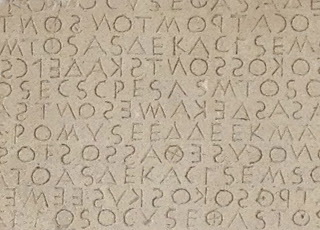Sometimes I meet students who are afraid that evolutionary science poses a threat to their belief in God. I think it is helpful for them to ask themselves this question:
Of course, this doesn't clear up all the obstacles to reconciling religious belief and confidence in science, but it's a start.
If you're a teacher of students who also grapple with this, and you don't understand them, this might help. Some of them will certainly be unreasonable. For them, sometimes all you can do is be an example of reasonable beliefs and hope it sinks in someday. But many of them are concerned about a few big questions, like these:
Acknowledging your students' concerns will help them to see that you care about them as people and not just as names or numbers on a page. Which will already begin to address their deepest concerns.Is God capable of creating through natural processes?There are only two answers to this question. If you say no, you make God too small to be worth worshiping. If you say yes, then you see that there's no prima facie reason why belief in God and belief in evolution need to be opposed to one another.
Of course, this doesn't clear up all the obstacles to reconciling religious belief and confidence in science, but it's a start.
*****
*****
If you're a teacher of students who also grapple with this, and you don't understand them, this might help. Some of them will certainly be unreasonable. For them, sometimes all you can do is be an example of reasonable beliefs and hope it sinks in someday. But many of them are concerned about a few big questions, like these:
- The trust they've placed in their community. Think about it: if your parents or your pastor or someone else you trusted taught you that there's an irreconcilable conflict between science and faith, you might distrust anyone who said otherwise. It might help such students to go back to that community and ask the question I posed above. This may take time, because there's a lot at stake here.
- An even bigger concern is the question of human dignity. I think that's what's behind the old complaint that "I'm not descended from monkeys." If the student is simply concerned about being descended from unwashed furry critters, they should probably look more closely at their family trees. Monkeys are often nicer than our actual relatives.
- But there's another concern here that's actually quite positive, because it means that they care about ethics, and they're trying to preserve that in the face of a perceived threat. Some students correctly intuit that what's at stake in evolution is not merely a theory of descent but a whole theory of knowledge, and of metaphysics. Natural sciences rest upon an assumption of methodological naturalism. That is, they assume that it is possible to explain natural phenomena by appeal to nature and nothing else. So far, so good. But sometimes we then make a little leap to saying that therefore whatever naturalism cannot explain is unknowable or nonexistent. This is not just naturalism but a kind of reductionistic naturalism, and it's tricky territory, because it might imply that there is no real basis for ethics, or for valuing others' lives. I'm not saying we're not free to value others' lives; I'm just saying that some of these students want to believe that there are good reasons to expect everyone to value everyone, not merely a world of subjective interests. And many of them are reasonably suspicious that reductionistic naturalism cannot itself be supported by science; after all, how could natural science prove that what it can't see isn't there? Such claims sound a bit like the misdirection of Wizard of Oz: "Pay no attention to the man behind the curtain!" We'd be better off avoiding such claims, both because we cannot prove them and because they do a disservice to science.










